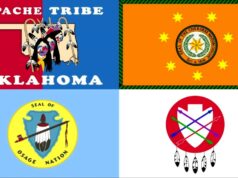
Last summer’s U.S. Supreme Court ruling on McGirt v. Oklahoma sparked numerous questions and complexities surrounding Indigenous and non-tribal jurisdiction. As these questions arise from ongoing litigation and coming court decisions, Oklahoma journalists are working together to find answers via the Promised Land collaborative.
The answers to these questions are important to the open-ended storyline about government-to-government negotiations and agreements among the state of Oklahoma, the Cherokee Nation, the Muscogee Nation, the Chickasaw Nation, the Choctaw Nation, the Seminole Nation and other tribal nations.
This post is a part of the Oklahoma Media Center’s Promised Land effort, which shows how the landmark McGirt v. Oklahoma decision will affect both tribal and non-Indigenous residents in the state.
The following recap features the opening paragraphs of seven stories published between June 1 and June 18 by Oklahoma reporters. Stories about funding sought by the Biden administration, proposed federal legislation and a Supreme Court ruling on tribal policing authority highlight this recap.
To read more from each story, click on the provided hyperlinks.
The snippets below have been edited lightly for date clarity, style and to include additional links to relevant information.
Biden administration seeking $82 million for McGirt-related costs in Oklahoma
By Chris Casteel
The Oklahoman
June 13, 2021
The Biden administration is seeking $82 million in additional funding for U.S. attorneys, FBI agents, marshals and other federal staff to handle the spike in caseloads resulting from the change in criminal jurisdiction on the newly affirmed Indian reservations in Oklahoma.
“We used to be — other than Guam — the smallest U.S. attorneys office” out of 93, said Doug Horn, senior litigation counsel in the Eastern District of Oklahoma, which is based in Muskogee. “Now we’re going to be in the top third in personnel.”
The FBI office in Oklahoma, which must now investigate crimes on the reservations, has become on the of the busiest FBI offices in the country for criminal matters.
Read more about the Biden administration’s funding to Oklahoma here.
Courts ‘in limbo’ as Ottawa County tribes await reservation rulings
By Joe Tomlinson
NonDoc
June 18, 2021
MIAMI — Over the next six months, the Oklahoma Court of Criminal Appeals is expected to make decisions about whether the landmark McGirt ruling applies to as many as eight tribal nations within Ottawa County, a situation that has left the county court system “in limbo,” according to District Attorney Kenny Wright.
Since April, Ottawa County District Court Judges Barry Denney and Becky Baird have each ruled several times that Native American defendants could not be prosecuted by the state of Oklahoma because the crimes in question occurred within the boundaries of historic reservations that have not been disestablished. Located in the northeast corner of Oklahoma, Ottawa County features the headquarters of nine tribal nations.
“We’re dealing with cases where I anticipate the Court of Criminal Appeals is going to agree with the district court that there’s still a reservation there,” Wright said.
Read more about the situation in Ottawa County here.
Chickasha police officers can now enforce tribal law on Native American suspects
By Brya Berry
KFOR
June 11, 2021
CHICKASHA — The Bureau of Indian Affairs is putting a new plan into action for police officers in Indian territory.
It comes nearly a year after the U.S. Supreme Court’s McGirt ruling.
More than a dozen Chickasha police officers were sworn into the Special Law Enforcement Commission on June 11, making sure they’ll be able to handle tribal cases.
“It allows these officers to enforce federal law and travel law,” said Brian Stark with the Bureau of Indian Affairs.
Read more about the sworn-in Chickasha police officers here.
Federal notice on surface coal mining a ‘significant loss of power by Oklahoma’
By Joe Tomlinson
NonDoc
June 8, 2021
The U.S. Office of Surface Mining Reclamation and Enforcement added a notice to the Federal Registry on May 18 that prevents the state of Oklahoma from exercising regulatory jurisdiction under the Surface Mining Control and Reclamation Act of 1977 on lands of the Muscogee Nation, which recently had its reservation affirmed by the U.S. Supreme Court.
The notice means the Oklahoma Conservation Commission and Oklahoma Department of Mines now only have enforcement authority and authorization to conduct “routine” regulatory activities over active and abandoned coal mines within the Muscogee Nation. Previously, the state agencies also made and implemented rules regarding surface coal mining and reclamation.
Owing to subsequent state-court decisions also affirming the Cherokee, Chickasaw, Choctaw and Seminole reservations, some attorneys believe the new federal order applies to the bulk of eastern Oklahoma.
Read more about Oklahoma’s loss of surface mining jurisdiction here.
State prosecutors still fighting McGirt cases as jurisdiction questions remain
By Chris Casteel
The Oklahoman
June 7, 2021
State prosecutors have won a few victories recently in their efforts to blunt the impact of court decisions reaffirming Indian reservations in eastern Oklahoma, though their successes may be short-lived.
In the past month, the Oklahoma Court of Criminal Appeals ordered that five prison inmates whose convictions were overturned because their crimes involved Native Americans remain in state custody indefinitely. Four of the inmates were convicted murderers.
The court agreed to keep the inmates in state custody because of two pending appeals. One is the question it has agreed to address of whether the U.S. Supreme Court decision in the McGirt v Oklahoma case last year applied retroactively.
The answer to that question — posed by a district attorney in eastern Oklahoma — could have a major impact on how many state inmates have their convictions reversed in cases involving Native Americans.
Read more about the questions of jurisdiction that have risen from the McGirt ruling here.
Proposed update to McGirt ruling on tribal jurisdiction receiving pushback
By Alex Cameron
News 9
June 2, 2021
WASHINGTON D.C. — A proposed legislative solution in Congress to the current confusion surrounding criminal jurisdiction in Oklahoma Indian Country is getting more pushback, even as the Supreme Court — whose ruling a year ago led to the confusion — considers whether to weigh in on the matter again.
U.S. Rep. Tom Cole introduced legislation last month, 10 months after the Court’s 5-4 ruling in McGirt v. Oklahoma, offering a potential solution for two of the five tribes impacted — the Cherokee Nation and the Chickasaw Nation. In McGirt, the majority determined that Congress never properly disestablished the Muscogee Nation reservation. The Oklahoma Court of Criminal Appeals has affirmed the same for the Cherokee, Chickasaw, Creek, Choctaw and Seminole tribes. Thus, per the Major Crimes Act, crimes committed by or against Indians in Indian Country are still the jurisdiction of the federal or tribal government, not the state.
Hundreds of convictions have since been vacated, leaving U.S. attorney offices and tribal law enforcement scrambling to refile charges in old cases, as well as, deal with new cases.
Read more about Tom Cole’s state compacting bill here.
U.S. Supreme Court clarifies authority of tribal police on reservations
By Chris Casteel
The Oklahoman
June 1, 2021
Addressing a situation that could become increasingly common in Oklahoma, the U.S. Supreme Court ruled June 1 that tribal law enforcement officers can temporarily detain and search non-Indian suspects traveling on public roads in Indian reservations.
In a unanimous decision in a case from the Crow reservation in Montana, the high court said a Crow police officer had the authority to detain a non-Indian stopped on the side of a highway and search him and his vehicle, in which the officer saw methamphetamine and guns.
The suspect was later indicted by a federal grand jury, but a federal judge granted a motion to suppress the drug evidence the Crow officer had seized, saying the officer “lacked the authority to investigate non-apparent violations of state or federal law by a non-Indian on a public right-of-way crossing the reservation,” according to the opinion issued June 1.
Read more about the SCOTUS ruling on tribal policing authority here.






















